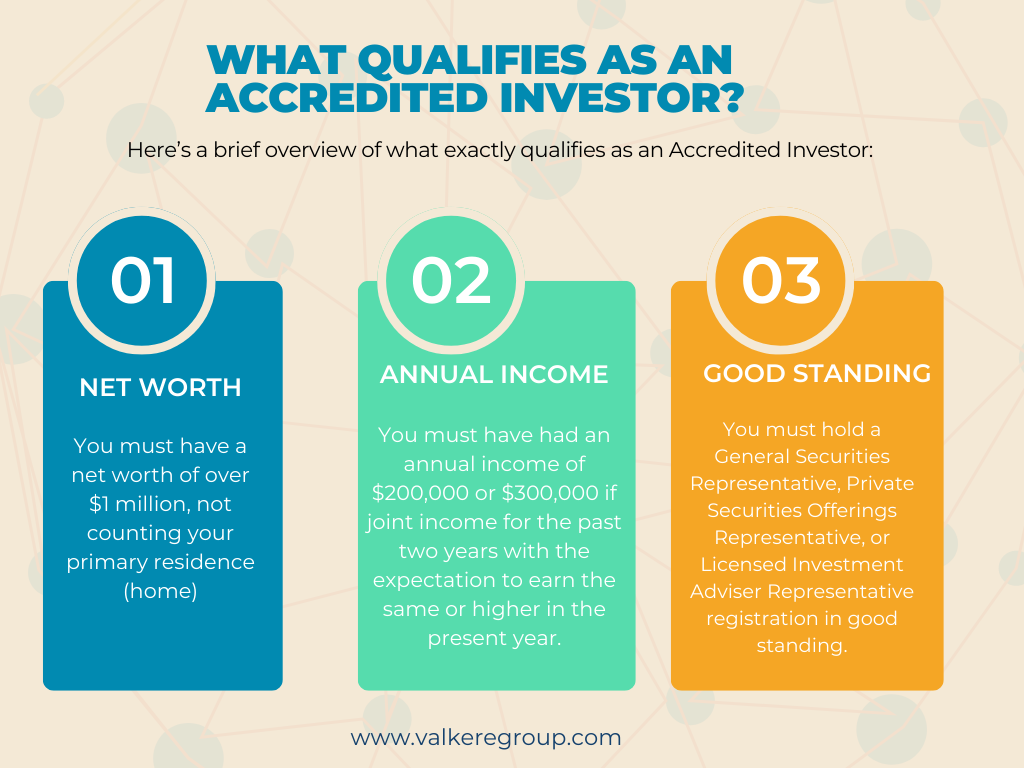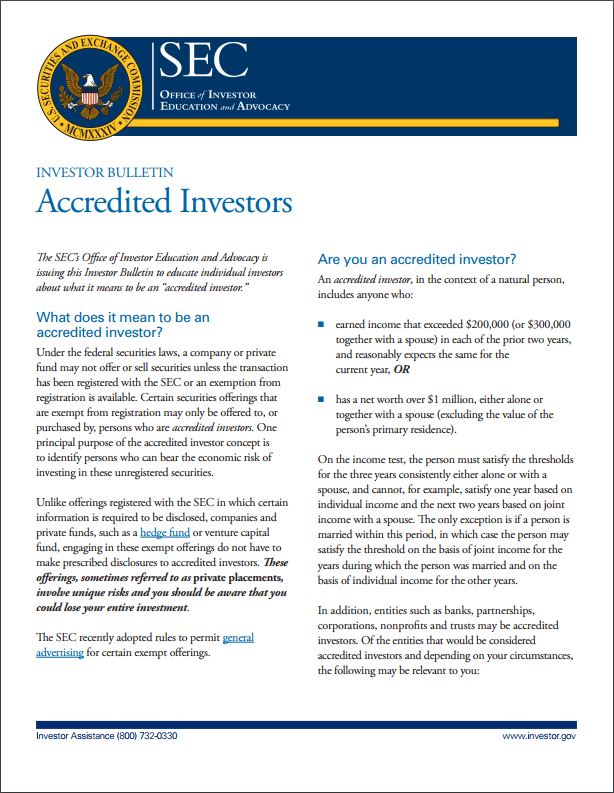All Categories
Featured
Table of Contents
A specific need to have a total assets over $1 million, omitting the key home (separately or with partner or partner), to qualify as an accredited financier. Demonstrating adequate education and learning or work experience, being a signed up broker or financial investment advisor, or having certain specialist certifications can likewise certify an individual as a recognized financier.
Recognized financiers have access to financial investments not registered with the SEC and can consist of a "spousal matching" when identifying credentials. Certified investors may encounter potential losses from riskier investments and must prove economic elegance to take part in unregulated investments (register as accredited investor). Approved investor status matters due to the fact that it figures out qualification for investment chances not available to the public, such as personal positionings, endeavor funding, hedge funds, and angel financial investments
Creditor Investor

To get involved, approved financiers must come close to the company of non listed protections, that might require them to complete a set of questions and offer financial files, such as income tax return, W-2 types, and account statements, to validate their status. Laws for recognized capitalists are managed by the united state Securities and Exchange Compensation (SEC), guaranteeing that they satisfy specific financial and professional requirements.
This growth of the recognized capitalist swimming pool is meant to maintain financier security while providing better access to non listed investments for those with the required monetary class and risk resistance. - criteria for accredited investor
Define Qualified Purchaser
Actual estate syndication is somewhat similar to REITs due to the fact that it also entails pooling sources to buy realty financial investments. A syndication deal is when several capitalists pool their resources together to purchase a solitary genuine estate home. This deal is assembled by a syndicator, also referred to as the general enroller.
These financiers will supply a lot of the resources required to obtain the home. The distinction with REITs is that you can pick what submission bargains to take part in. If you rely on the realty residential property being syndicated, you can join as one of the passive investors. Realty syndication can be finished with any sort of realty, yet multifamily submission is one of the most preferred kind because multifamily buildings frequently create a lot of regular earnings.
Additionally, these big homes are typically more difficult to get as an only capitalist, which is why syndication is a perfect configuration. Capitalists can take part in multifamily genuine estate investing with a much lower minimum financial investment.
Recognized capitalists do not have to collect rental income, take care of tenants, handle emergency situations, invest money on fixings, etc. Either the syndicator will hire a 3rd party residential property supervisor to do this or they will manage it themselves - accredited investor test. Each event in the multifamily syndication financial investment possesses a portion of the building.
In some cases the syndicator has a bigger percentage of the equity. The capital is normally split amongst the participants. This implies financiers get passive earnings from rental fees, and the ultimate building sales. This is based upon what percent of the building they own, relying on the offer framework.
Peerstreet Accredited Investor

Paid non-client promo: Affiliate links for the products on this web page are from partners that compensate us (see our advertiser disclosure with our listing of companions for even more details). Our point of views are our own - regulation d accredited investor requirements. See just how we rate investing products to write objective product testimonials. An accredited financier is a person or establishment that can invest in unregulated safety and securities.
Non listed securities are naturally risky yet usually offer greater prices of return. If you've ever discovered an investment readily available just to supposed recognized financiers, you've most likely questioned what the term meant. The label can use to entities ranging from enormous banking institutions and wealthy Fortune 500 companies, right down to high-earning houses and also people.
, granting market access to smaller sized business that might otherwise be squashed under the costs coming with SEC enrollment.
Investors without accreditation can take care of the complete breadth of authorized safety and securities like supplies, bonds, and mutual funds. They can likewise accumulate wealth, purchase property, develop retirement profiles, take risks, and reap rewards the biggest distinction is in the range of these ventures. One of the benefits of being an accredited financier is that as soon as you acquire this standing, it "opens" accessibility to products not offered to the general public, such as hedge funds, endeavor capital funds, exclusive equity funds, and angel investing.
The SEC considers hedge funds a much more "flexible" investment method than something like shared funds, because hedge funds use speculative techniques like take advantage of (sophisticated investor criteria) and brief selling. Considering that these complex products call for added research and understanding, capitalists need to show that they understand the risks associated with these kinds of financial investments before the SEC fits with them diving in
While lots of are mostly knowledgeable about the SEC's consumer protection initiatives, the regulative authority's obligations are in fact twofold. In enhancement to guarding capitalists, it's likewise in charge of funding formation basically, aiding the marketplace gather resources. To make certain that those two initiatives aren't in conflict, it's occasionally necessary for the SEC to pair up high-risk, high-reward opportunities with suitable investors.
Non Accredited Investor Real Estate
One aids navigate the unregulated market, and the other will float you to safety should the waves threaten. The average investor is secure on the beach or paddling in the shallows, safe under the careful stare of the lifeguard (i.e., the SEC). Safeties that are offered to certified financiers are supplied via personal offerings, which might include fewer regulations than safety and securities offered to even more normal investors.
By Percent - January 11, 2021 When it pertains to purchasing stocks and bonds, virtually any person can spend. As long as you're over the age of 18 (or 21, in some states), not trading on details, or otherwise investing as part of a dispute of passion, you can be a part of public markets whether you have $1 or $1 million.
Certain financial investment vehicles consisting of those on Percent are just offered to a course of capitalists lawfully defined as These investors have the explicit consent from governing bodies based on a slim collection of requirements to invest in particular types of investments in personal markets. Who can be a certified financier? Much better yet, why are accredited capitalists a point in the first area?
The Stocks and Exchange Compensation (SEC) eventually adopted rule 501 of Regulation D, which formalized that might spend in personal offerings and specified the term "recognized financier" a term that was later on upgraded in 2020. An accredited financier is any individual who satisfies any of the adhering to standards: Capitalists with earned revenue that exceeded $200,000 (or $300,000 with each other with a spouse) in each of the prior two years, and expects to satisfy the same standards in the existing year.
Those who are "experienced workers" of a private fund. SEC- and state-registered investment advisers (but not reporting experts) of these entities can also now be considered accredited capitalists.
Sec Regulation D Rule 501

For instance, if you have a total assets of over $1 million (not including your primary property/residence), made $200,000+ a year for the last 2 years, or have your Collection 7 permit, you can make financial investments as a certified financial investments. There are many various other qualifications (as you can find above), and the SEC intend on adding extra in the close to future.
Considering that the very early 1930s, federal government regulators have actually discovered it difficult to shield investors in exclusive offerings and securities while simultaneously sustaining the development of startups and various other young companies - firms that lots of think are accountable for the bulk of job development in the USA - accredited investor investments. Balancing this task had actually been center of the mind of the Securities and Exchange Compensation ("SEC") for several years
Table of Contents
Latest Posts
Tax Lien Investing 101
2020 Delinquent Property Tax Auction
Tax Liens Investments
More
Latest Posts
Tax Lien Investing 101
2020 Delinquent Property Tax Auction
Tax Liens Investments